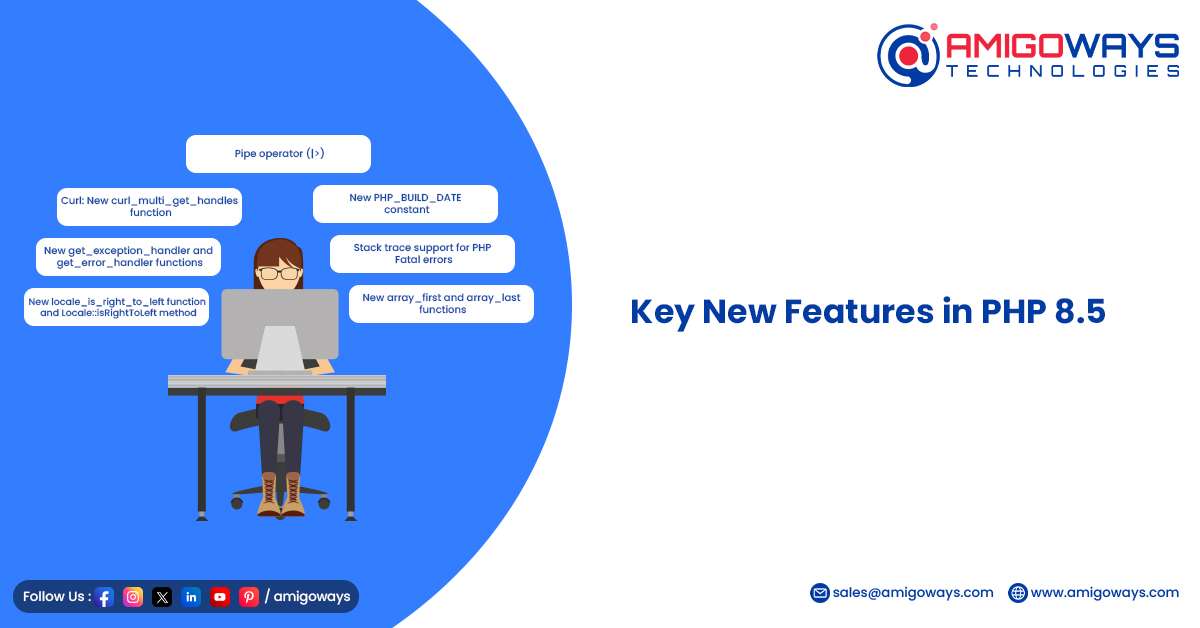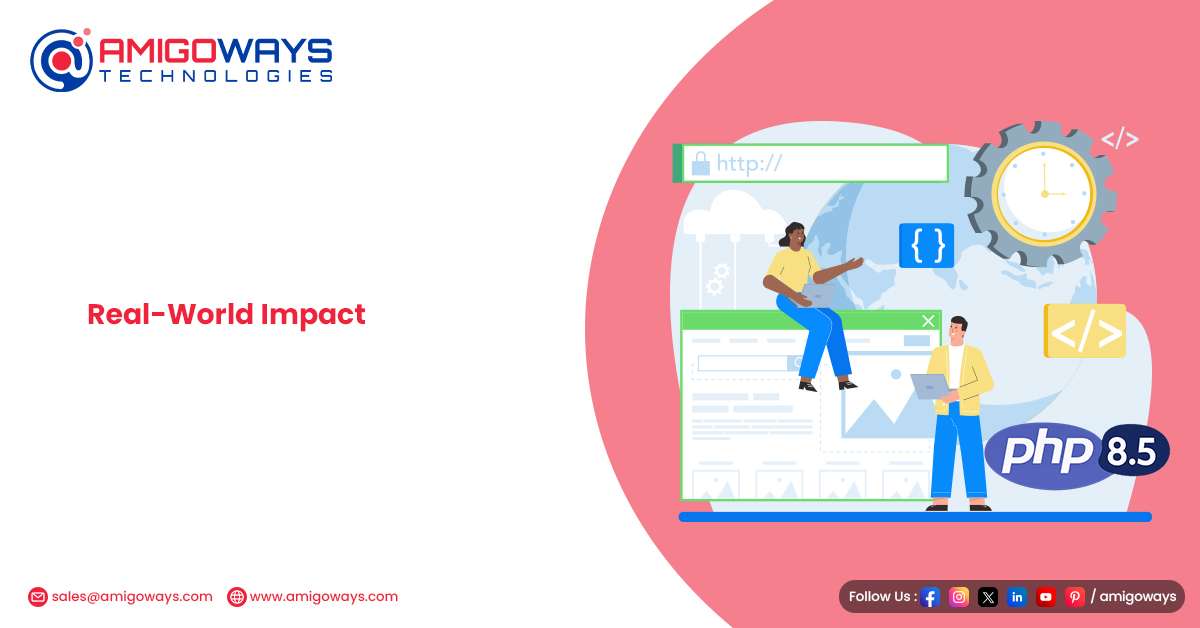PHP continues to evolve with every release, making the language faster, smarter, and more developer-friendly. With the arrival of PHP 8.5, the focus shifts toward practical refinements that streamline everyday development. This version isn’t about big syntax changes, but rather smart enhancements that reduce boilerplate, modernize legacy features, and boost productivity.
Scheduled for release in November 2025, PHP 8.5 brings much-needed improvements for real-world coding scenarios especially for teams building APIs, managing legacy apps, and focusing on clean, maintainable code.
As a leading web and app development company, Amigoways highlights the most impactful features you can start using to future-proof your PHP projects.
Key New Features in PHP 8.5
PHP 8.5 introduces practical enhancements that streamline coding workflows, improve error handling, and add modern development capabilities. From the highly anticipated pipe operator to smarter array handling and better locale support, these features help developers write cleaner, more maintainable, and efficient code for real-world applications
- Pipe operator (|>)
- Curl: New curl_multi_get_handles function
- New PHP_BUILD_DATE constant
- New get_exception_handler and get_error_handler functions
- Stack trace support for PHP Fatal errors
- New locale_is_right_to_left function and Locale::isRightToLeft method
- New array_first and array_last functions
- CLI: php –ini=diff to output non-default INI directives
- Intl: New IntlListFormatter class
1. Pipe Operator (|>)
The pipe operator enables streamlined function chaining, passing the output of one expression directly into another. This simplifies complex function nesting and improves code readability.
Example:
$result = "Hello World"
|> strtoupper(...)
|> str_shuffle(...)
|> trim(...);
2. New curl_multi_get_handles() Function
This addition to the cURL extension allows developers to retrieve all active handles from a multi-cURL session, making parallel HTTP requests easier to manage.
Example:
$ch1 = curl_init(‘https://example.com/foo’);
$ch2 = curl_init(‘https://example.com/bar’);curl_multi_add_handle($cm, $ch1);
curl_multi_add_handle($cm, $ch2);curl_multi_get_handles($cm);
// [$ch1, $ch2]
3. New PHP_BUILD_DATE Constant
Provides the build date of the PHP binary, helping developers track deployment environments and diagnose version inconsistencies.
Example:
echo PHP_BUILD_DATE;
// Sep 16 2025 10:44:26
PHP_BUILD_DATE Date and Time format
The date and time assigned to the PHP_BUILD_DATE constant is in PHP’s M j Y H:i:s format.
Note that the date of the month (j) is space-prefixed if the date of the month is fewer than 10. For example, PHP builds on September 3rd will have PHP_BUILD_DATE value Sep 3 2025 10:44:26.
This value can be parsed to a DateTimeImmutable object as shown below:
$dt= DateTimeImmutable::createFromFormat(‘M j Y H:i:s’,PHP_BUILD_DATE);
$dt->format(‘U’);// Unix timestamp, e.g. “1758019466”
$dt->format(‘Y-M-d’);// “2025-Sep-16”
4. New get_exception_handler() and get_error_handler() Functions
These functions allow you to retrieve the current exception and error handlers, giving you more control over error handling workflows and making debugging easier.
New get_exception_handler function
The new get_exception_handler function in PHP 8.5 works similarly to the get_error_handler function. It returns the currently set exception handler, or null if there is no exception handler set.
/**
* Returns the currently set exception handler, or null if none is set.
* @return callable|null
*/
function get_exception_handler(): ?callable {}
New get_error_handler function
PHP 8.5 adds a new function named get_error_handler that returns the currently active error handler:
/**
* Returns the currently set error handler, or null if none is set.
* @return callable|null
*/
function get_error_handler(): ?callable {}
5. Stack Trace Support for Fatal Errors
PHP fatal errors now include detailed stack traces, greatly improving error diagnosis in production and development environments. This feature is configurable via the fatal_error_backtrace INI directive.
For example, to turn off fatal error backtraces, set the INI directive as shown below:
fatal_error_backtraces = Off
6. Locale Text Direction Detection
New functions locale_is_right_to_left() and Locale::isRightToLeft() allow you to check whether a given locale reads from right to left. This is a valuable addition for global applications supporting RTL languages.
New locale_is_right_to_left function
/**
* Returns whether the given $locale has an RTL script.
* @param string $locale
* @return bool Whether the script is RTL
*/
function locale_is_right_to_left(string $locale): bool {}
- The locale_is_right_to_left function is declared in the global namespace.
- Passing no parameters throws an ArgumentCountError.
- Passing an empty string returns false.
- Passing an invalid locale returns false.
The error handling behavior, for example, on empty an invalid locale, is consistent other other locale_ functions that return false-y return values on invalid inputs.
New Locale::isRightToLeft static method
class Locale {
// ...
/**
* Returns whether the given $locale has an RTL script.
* @param string $locale
* @return bool Whether the script is RTL
* @alias locale_is_right_to_left
*/
public static function isRightToLeft(string $locale): bool {}
}
- Locale::isRightToLeft is a static method.
- Follows identical error handling to the locale_is_right_to_left function.
7. New Array Helper Functions: array_first() and array_last()
These new built-in functions allow you to retrieve the first and last elements of an array without affecting its internal pointer.
Array First
The array_first function returns the first array value of a given array. On a list-arrays, this essentially the key 0 value. However, array_first returns the first value even on associative arrays.
/**
* Returns the first value of a given array.
*
* @param array $array The array to get the first value of.
* @return mixed First value of the array, or null if the array is
* empty. Note that null itself can also be a valid array value.
*/
function array_first(array $array): mixed {}
Example:
array_first([1, 2, 3]); // 1
array_first([2, 3]); // 2
array_first([‘a’ => 2, ‘b’ => 1]); // 2
array_first([null, 2, 3]); // null
array_first([]); // null
array_first([$obj, 2, 3]); // $obj
array_first([1])); // 1
array_first([true]); // true
Array Last
/**
* Returns the first value of a given array. * * @param array $array The array to get the first value of.
* @return mixed First value of the array, or null if the array is
* empty. Note that null itself can also be a valid array value.
*/
function array_last(array $array): mixed {
return empty($array) ? null : $array[array_key_last($array)];
}
Example:
array_last([1, 2, 3]); // 3
array_last([2, 3]); // 3
array_last([‘a’ => 2, ‘b’ => 1]); // 1
array_last([2, 3, null]); // null
array_last([]); // null
array_last([2, 3, $obj]); // $obj
array_last([1])); // 1
array_last([true]); // true
8. CLI Enhancement: php --ini=diff
This command displays only non-default INI directives, helping developers and system administrators quickly audit environment configurations.
New php –ini=diff CLI flag
php –ini=diff
Non-default INI settings:
html_errors: “1” -> “0”
implicit_flush: “0” -> “1”
max_execution_time: “30” -> “0”
9. New IntlListFormatter Class
Part of the Intl extension, this class formats lists in a locale-aware manner, enhancing multilingual support for user interfaces.
$formatter = new IntlListFormatter(‘en’, IntlListFormatter::TYPE_CONJUNCTION);
echo $formatter->format([‘Red’, ‘Green’, ‘Blue’]); // “Red, Green, and Blue”
Deprecations in PHP 8.5
– All MHASH_* Constants Deprecated
The legacy MHASH_* constants are now deprecated. Developers are encouraged to use the more modern and secure hash() extension for cryptographic hashing.
Why PHP 8.5 is a Win for API Developers
Default closure parameters make it easier to define default API behaviors.
public function getUser(callable $formatter = static fn($data) => $data) {
$data = ['name' => 'John'];
return response()->json($formatter($data));
}
Modular Routing with First-Class Callables
Define route handlers as constants, improving code clarity in custom routers:
php
const AUTH_HANDLER = AuthController::verifyToken(…);
$router->add(‘GET’, ‘/secure’, AUTH_HANDLER);
When your API crashes, the new fatal error stack traces make it easy to pinpoint and resolve the issue.
Faster API Debugging with Fatal Error Backtraces
When your API crashes, the new fatal error stack traces make it easy to pinpoint and resolve the issue.
Real-World Impact
Cleaner & More Functional Code – The pipe operator enables expressive chaining, improving readability and functional-style programming.
Lower Debugging Overhead – Stack traces on fatal errors and handler inspection tools make troubleshooting far easier.
Better Array Handling – array_first() and array_last() reduce boilerplate and prevent pointer side effects.
Simplified Localization – RTL detection and IntlListFormatter aid robust internationalization workflows.
Environment Transparency – New CLI and build-info tools assist developers in managing configurations and builds more reliably.
Conclusion: Practical Improvements That Matter
PHP 8.5 is a developer productivity release. While it doesn’t introduce sweeping new paradigms, its focused improvements:
- Reduce repetitive code
- Improve debugging reliability
- Modernize legacy patterns
- Simplify API and microservice development
If you’re building RESTful APIs, eCommerce platforms, or enterprise applications, PHP 8.5 provides the tools to keep your codebase clean, maintainable, and future-proof.
Contact us today to discuss your PHP development needs and ensure your business stays ahead in the digital world.





